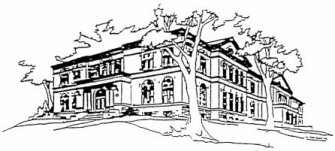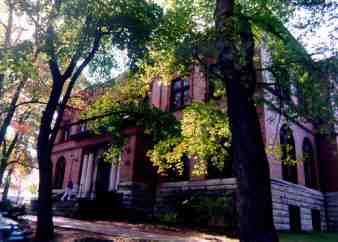 Library Tools
Library Tools
|
Andrew Carnegie Free Library & Music Hall
(!) Since 2010, the website has a new address - www.carnegiecarnegie.org
History
|

Oral Histories of Andrew Carnegie Free Library &
Music Hall
The Andrew Carnegie Free Library & Music Hall stands at a crossroads.
This beautiful old building in the heart of Carnegie has served as a
beacon of education, culture and community activities for not only
the town of Carnegie, but for the entire Chartiers Valley. Built with money
provided by the famed industrialist, the Andrew Carnegie Free Library & Music
Hall (ACFL&MH) is one of only four endowed libraries built by Andrew Carnegie in the
United States.
The ACFL&MH is the county's fifth oldest Carnegie Library. The ACFL&MH
is distinguished not only by its age and endowment, but by the fact that the
town it graces was named for Mr. Carnegie. In 1894, the two boroughs of
Mansfield and Chartiers consolidated to become one - Carnegie - in order to
encourage the philanthropist to donate a library and high school to the new
community. Indeed, while the Carnegie name is internationally associated with
libraries and he ultimately went on to build more than 2500 of them, the Andrew
Carnegie Free Library & Music Hall is the only library in the country bearing
Mr. Carnegie's first name!
The "Carnegie Carnegie" is an imposing "Italianate" structure, situated
prominently in a park-like setting of sweeping lawns and majestic old trees in
the center of Carnegie. As with a few other historic Carnegie institutions,
library does not adequately describe the facility. In addition to serving as
a community library of 30,000 volumes serving 36,000 patrons a year, the ACFL&MH
houses a lecture hall, a gymnasium, a 780-seat music hall as well as various
meeting rooms and offices.
The facility is also home to a genuine national treasure: the Civil War
Room that local veterans of that war used from 1906 until the mid-1930s for
meetings and to house their collection of flags, books, prints and relics.
When the Thomas Espy Post of the Grand Army of the Republic ceased operations,
the Civil War Room was locked and left undisturbed for 50 years. Not only does
it house invaluable artifacts, but it provides a unique historical record of the
first part of the century. Click here for additional information on the Civil War Room.
The Carnegie Music Hall - just off Broadway in downtown Carnegie - is an
elegant theater modeled on the acoustic excellence of its only slightly more
famous New York City counterpart. The Music Hall is home to three resident
performing arts companies: Carnegie Performing Arts Center, a non-profit dance
and drama school; Pittsburgh Savoyards, the longest running theatrical troupe in
Western Pennsylvania and specializing in Gilbert and Sullivan operettas; and
Stage 62, a true community theater for more than 40 years, performs four popular
plays annually. The Ninth Pennsylvania Reserves, a Civil War re-enactment
group, maintains and provides tours of the Civil War Room. The Music Hall with
its supporting spaces is the only theater facility west of downtown Pittsburgh
(other than those that are part of a school). In 1981, the ACFL&MH was listed
on the
National Register of Historic Places, one of only three buildings in
the Chartiers Valley to bear this distinction.
The Andrew Carnegie Free Library & Music Hall was built as a focal point
for its growing mill town, and indeed it has served in that capacity for 100
years and five generations of families -- not only from Carnegie but from the
surrounding communities of Collier Township, Heidelberg, Oakdale, Pennsbury
Village, Pittsburgh, Robinson Township, Rosslyn Farms, Scott Township, and
Thornburg.
The very mass, design and site of the Andrew Carnegie Free Library &
Music Hall was intended to convey permanence and prominence. So too was the
$93,000 with which it was endowed in 1901. Sadly though, without immediate
and strategic intervention, this fine old facility that resonates with historical,
architectural and community significance will become just a faded reminder of
its former proud role. The ACFL&MH's income long ago proved inadequate; the
endowment was spent down to meet operating needs. Other than modest rents and
fees, the Library, which occupies only 25% of the building, bears the financial
burden of maintaining the entire building. It has not been able to keep up.
In fact, very few renovations have occurred since the ACFL&MH was built,
a fact that both fans of fine architecture and casual visitors alike seem to
appreciate. Indeed, the original oak circulation desk has seen uninterrupted
use in the center of the library - a rarity in even other historical facilities.
While there is no insensitive remodeling to undo, and the building maintains
considerable structural integrity, the ACFL&MH building suffers from age, the
elements and inadequate maintenance. Its deteriorating condition threatens
continuation of library and community cultural services as they are, let alone
the expansion and addition of programs that the facility warrants, and which
would return the Andrew Carnegie Free Library & Music Hall to its intended
role as a vibrant library and cultural center.
The Andrew Carnegie Free Library & Music Hall needs not only major
structural renovations and upgrades, but it needs to re-examine its role as a
21st century cultural resource.
Oral Histories of Andrew Carnegie Free Library &
Music Hall
Penny Remembers Andrew Carnegie Free Library
We would like to hear from people with good stories about the
library or music hall. Please give your story and a picture to a librarian. If you
include your address, we will return the picture to you.
|
|
